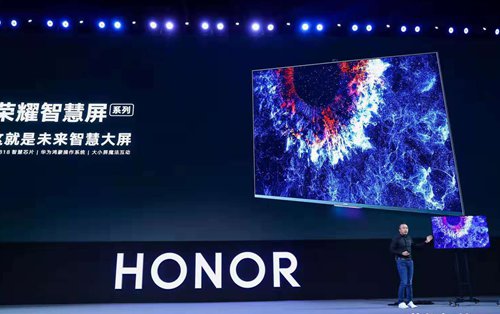HOME >> BUSINESS
Huawei to develop Harmony ecosystem to help industry break US domination
By Wang Yi Source:Global Times Published: 2019/8/11 18:48:40
Unyielding efforts expected to help industry break US domination

Zhao Ming, president of Honor, introduces the Honor Smart Screen at a launch event in Dongguan, South China's Guangdong Province, on Saturday. Photo: Courtesy of Huawei
During its annual developer conference over the weekend, Huawei has shown its goal of making its Harmony operating system (OS) a new hit and building a global developer ecosystem for it, instead of just making it a plan B to cushion the impact of the US attack on the company.
In the face of increasing pressure from the US, the Chinese technology giant's unyielding efforts to build its own global software developer ecosystem are expected to promote China's electronic information industry to break US domination in OS development, analysts said.
Huawei is planning to launch China's first open-source foundation in a month or two, Wang Chenglu, president of the Huawei consumer business group's software division, told the Global Times on Saturday.
The Huawei Honor Smart Screen, the world's first terminal powered by the HarmonyOS, was launched on Saturday. The terminal is equipped with three self-developed chips, a built-in artificial intelligence camera and a 55-inch high-resolution screen.
The company also revealed a cutting-edge "digital reality" technology "cyberverse (cyber and universe)," which can realize a massive combination of virtual reality and reality, on Sunday at the Huawei Developer Conference (HDC2019) in Dongguan, South China's Guangdong Province.
The technology will provide services like high-precision maps at five sites in first-tier Chinese cities by the end of 2019, and expand to 1,000 sites by the fourth quarter of 2020.
"Huawei will continue to lead a broader effort to build China's software developer ecosystem and complete industry chain for the electronic information industry, rather than just launch its OS," Xiang Ligang, director-general of the Beijing-based Information Consumption Alliance, told the Global Times.
The HarmonyOS is an open-source system, but without the support of most application developers, it can't grow at a rapid pace and neither can the industry, Xiang said.
The HarmonyOS was initially seen as an alternative plan to deal with the risks of losing access to Google's Android software and overseas market share after the US attack.
Huawei is confident in keeping its overseas market share and displayed an ambition to make the HarmonyOS successful.
Richard Yu Chengdong, CEO of Huawei's consumer business, said that the HarmonyOS can make Huawei's devices functional again overnight, if the Android OS on the devices fails.
Huawei has obviously entered a whole new stage of fully developing its OS, developer ecosystem and more terminals equipped with the OS. It will eventually build its Internet of Things based on its leading communication systems, rather than just focusing on mobile phone products, a veteran industry analyst told the Global Times on condition of anonymity.
These efforts are expected to promote the whole industry, because unlike a government-dominated model, the company-driven model enjoys big market support, he said.
Huawei will also upgrade its "Shining Star" program for developers to $1 billion, providing developers with more money than other platforms to encourage their innovation, said the company.
Huawei will also reveal 65- and 75-inch smart screen products. The screens will be supplied by TCL's Huaxing Optoelectronics, and the overall unit will be produced by BOE Technology Group's Gaochuang (Suzhou) Electronics Co, Caixin reported on Sunday.
Honor's goal is to become the first or second name brand in China, and among the top four in the world, Yu said.
Newspaper headline: Huawei aims for HarmonyOS developer ecosystem
Posted in: ECONOMY